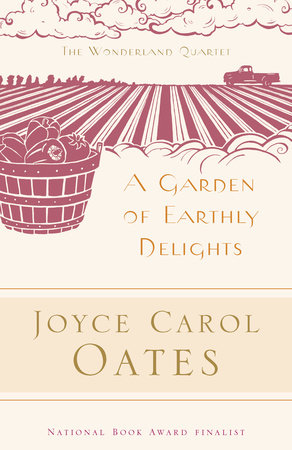A Garden of Earthly Delights Reader’s Guide
By Joyce Carol Oates


1. By focusing on the stories of Carleton, Clara, and Swan, Oates allows her readers to become intimately familiar with three of A Garden of Earthly Delights’s characters. Which character do you most empathize with and why?
2. In your opinion, why is Carleton indifferent to most of his children and what makes him particularly fond of his beloved Clara?
3. How are migrant workers stigmatized in the text and how do the Walpoles both conform to and break away from these stereotypes?
4. Lowry and Clara’s relationship begins rather unusually. What did you make of Lowry when he first appeared in Clara’s life? How did your perception of him change later in the novel?
5. A Garden of Earthly Delights chronicles the lives of characters who are haunted by their individual pasts and by the pasts of their ancestors. What examples of this can you find in the text?
6. The parent-child relationship is central to the novel: sometimes the intimacy between a mother and child mimics that usually found between a husband and wife; at other points in the novel, romantic relationships in the novel take on a peculiar father-daughter dynamic. Discuss this blurring of boundaries in Clara’s various relationships with men.
7. Oates reveals, “To Clara, a man’s love was no sign of his strength but rather of his weakness, something you wanted from him but then had to feel a little sorry about taking.” In several instances in the text, love is explicitly described as a weakness. Discuss how this theme is subtly weaved throughout the text.
8. Oates describes Clara’s frustration at her lack of education by saying, “Clara was thinking: if she could read better–if she could write–if she didn’t have to struggle so with words, things would come easier for her. There were times when an idea brushed her mind, but she couldn’t seize it. Like a butterfly fluttering out of her reach.” What role does the thirst for knowledge play in Clara’s life and later in the life of her son Swan?
9. Oates explains why Swan suddenly loses interest in reading and learning in the following lines: “All knowledge is a drug, Swan believed. And all drugs can be addictive. He would fight it. He knew how. He’d isolated it–this sensation as of imminent helplessness–as the way I which a fetus grows in its mother’s belly: tiny head taking form, tiny arms, legs, torso, fish-body becoming human, sucking its energy from the encasing flesh and growing, always growing.” Discuss the characters in the novel and their struggles against helplessness or various forms of addiction.
10. When Clark confides in his stepmother about Jonathan’s problematic behavior, Clara misses the point, saying, “I’m sorry to hear this, Clark. I…like Jonathan….I think he likes me…” What does her response reveal about her character and her relationship to the Revere family (of which she is now a part)?
11. A lack of choices and opportunities is usually connected to poverty, as evident in the beginning of the novel. However, in several instances, Swan records his frustration at being a member of the Revere family, where “nothing is left to chance” and “the only way out of it was the way Robert had gone, by accident, or Jonathan had taken on purpose.” Discuss why Swan, who, through has mother’s marriage, has acquired prestige, an education, and wealth, feels trapped by his newfound position in society.
12. What draws Clara and Judd together and how is Clara’s relationship with Judd different from her relationship with other men in her life?
13. Oates discusses Swan’s reluctance to form intimate relationships, “Swan understood then that he could not talk to her (Loretta) and if he tried he would only disturb her. He could not talk to his mother either, and of course not to his father, and never to Clark and never to his teachers, and it made sense that he could not now talk to Loretta…” Describe Swan’s growing feelings of isolation from others that begin in his childhood and culminate in his final act of violence.
14. In her Afterword, Oates explains that “though such terms as ‘victims of abuse’ —‘abuse survivors’–are clichés at the present time, they did not exist in the era of A Garden of Earthly Delights. It was not uncommon in certain quarters for men to beat their families and remain morally as well as legally blameless; though sexual harassment, sexual molestation, and rape may have been commonplace, the vocabulary to define them was not, and it would have been a rare case reported, and a yet rarer case taken seriously by the police.” In the light of this knowledge, how do you think the reader’s reception of this novel upon its original publication in 1966 was different from that of today’s reader?
Just for joining you’ll get personalized recommendations on your dashboard daily and features only for members.
Find Out More Join Now Sign In